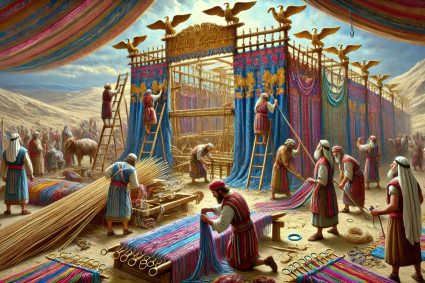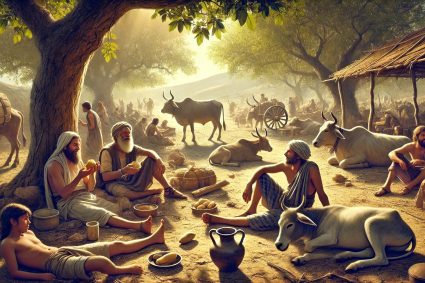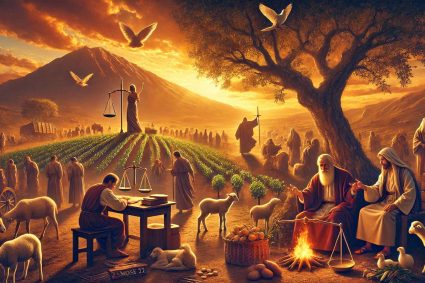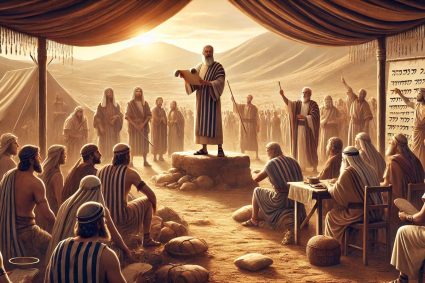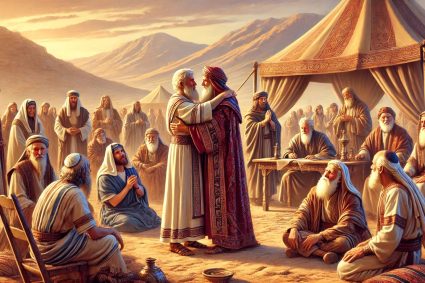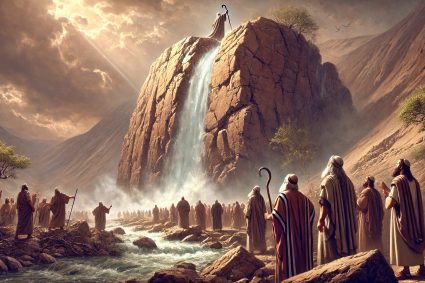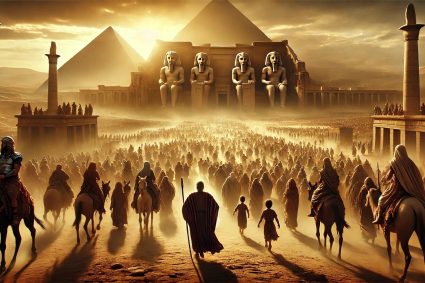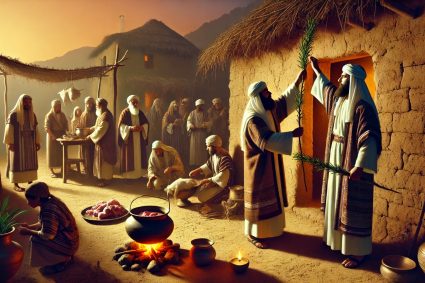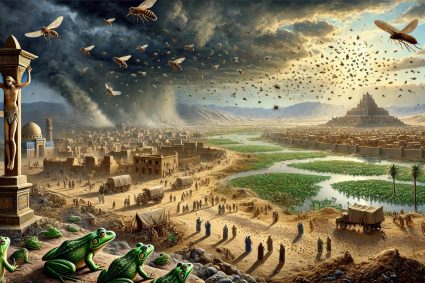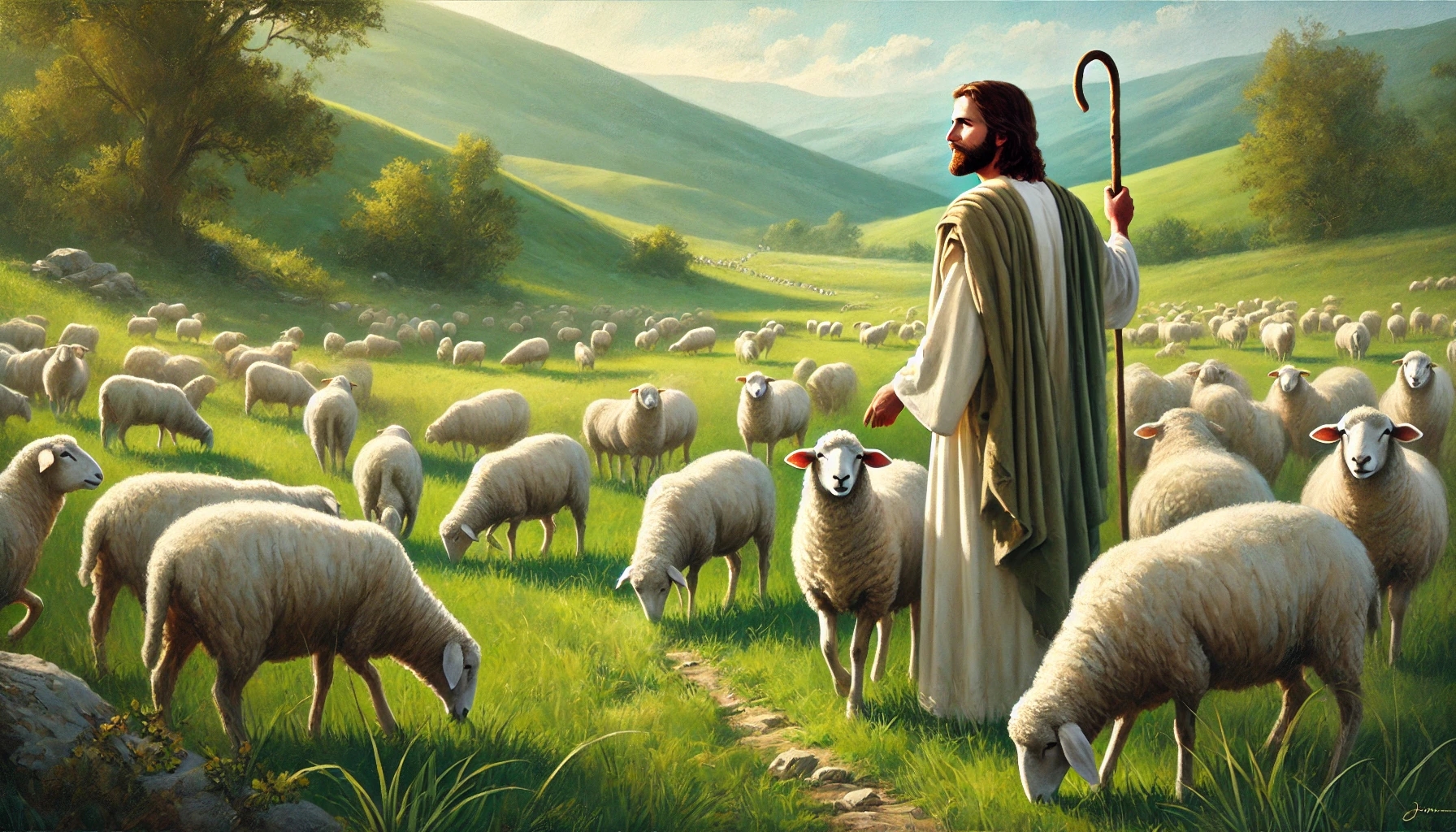
October 16, 2024
DAILY BIBLE READING – John Chapter 10
1 Verily, verily, I say unto you, He that entereth not by the door into the sheepfold, but climbeth up some other way, the same is a thief and a robber.
2 But he that entereth in by the door is the shepherd of the sheep.
3 To him the porter openeth; and the sheep hear his voice: and he calleth his own sheep by name, and leadeth them out.
4 And when he putteth forth his own sheep, he goeth before them, and the sheep follow him: for they know his voice.
5 And a stranger will they not follow, but will flee from him: for they know not the voice of strangers.
6 This parable spake Jesus unto them: but they understood not what things they were which he spake unto them.
7 Then said Jesus unto them again, Verily, verily, I say unto you, I am the door of the sheep.
8 All that ever came before me are thieves and robbers: but the sheep did not hear them.
9 I am the door: by me if any man enter in, he shall be saved, and shall go in and out, and find pasture.
10 The thief cometh not, but for to steal, and to kill, and to destroy: I am come that they might have life, and that they might have it more abundantly.
11 I am the good shepherd: the good shepherd giveth his life for the sheep.
12 But he that is an hireling, and not the shepherd, whose own the sheep are not, seeth the wolf coming, and leaveth the sheep, and fleeth: and the wolf catcheth them, and scattereth the sheep.
13 The hireling fleeth, because he is an hireling, and careth not for the sheep.
14 I am the good shepherd, and know my sheep, and am known of mine.
15 As the Father knoweth me, even so know I the Father: and I lay down my life for the sheep.
16 And other sheep I have, which are not of this fold: them also I must bring, and they shall hear my voice; and there shall be one fold, and one shepherd.
17 Therefore doth my Father love me, because I lay down my life, that I might take it again.
18 No man taketh it from me, but I lay it down of myself. I have power to lay it down, and I have power to take it again. This commandment have I received of my Father.
19 There was a division therefore again among the Jews for these sayings.
20 And many of them said, He hath a devil, and is mad; why hear ye him?
21 Others said, These are not the words of him that hath a devil. Can a devil open the eyes of the blind?
22 And it was at Jerusalem the feast of the dedication, and it was winter.
23 And Jesus walked in the temple in Solomon’s porch.
24 Then came the Jews round about him, and said unto him, How long dost thou make us to doubt? If thou be the Christ, tell us plainly.
25 Jesus answered them, I told you, and ye believed not: the works that I do in my Father’s name, they bear witness of me.
26 But ye believe not, because ye are not of my sheep, as I said unto you.
27 My sheep hear my voice, and I know them, and they follow me:
28 And I give unto them eternal life; and they shall never perish, neither shall any man pluck them out of my hand.
29 My Father, which gave them me, is greater than all; and no man is able to pluck them out of my Father’s hand.
30 I and my Father are one.
31 Then the Jews took up stones again to stone him.
32 Jesus answered them, Many good works have I shewed you from my Father; for which of those works do ye stone me?
33 The Jews answered him, saying, For a good work we stone thee not; but for blasphemy; and because that thou, being a man, makest thyself God.
34 Jesus answered them, Is it not written in your law, I said, Ye are gods?
35 If he called them gods, unto whom the word of God came, and the scripture cannot be broken;
36 Say ye of him, whom the Father hath sanctified, and sent into the world, Thou blasphemest; because I said, I am the Son of God?
37 If I do not the works of my Father, believe me not.
38 But if I do, though ye believe not me, believe the works: that ye may know, and believe, that the Father is in me, and I in him.
39 Therefore they sought again to take him: but he escaped out of their hand,
40 And went away again beyond Jordan into the place where John at first baptized; and there he abode.
41 And many resorted unto him, and said, John did no miracle: but all things that John spake of this man were true.
42 And many believed on him there.
King James Version. Public Domain
Commentary
Introduction
John Chapter 10 contains the well-known teaching of Jesus about the “Good Shepherd.” Jesus uses the image of the shepherd to explain His relationship with the believers. He portrays Himself as the good shepherd who is willing to lay down His life for the sheep. Throughout this chapter, Jesus’ care, guidance, and willingness to sacrifice are highlighted, while He simultaneously depicts the religious leaders of His time as “hired hands” who do not genuinely care for the well-being of the people.
Commentary
The Good Shepherd (John 10:1-18)
In this passage, Jesus uses the image of the shepherd and His sheep to explain His role as Savior and Protector. Jesus emphasizes that a true shepherd enters the sheepfold by the door and that the sheep listen to the shepherd’s voice. He explains that He is the “door” through which the sheep are saved, and that all who do not come through Him are like thieves and robbers. This refers to false teachers and religious leaders who lead God’s people astray.
Jesus calls Himself the “Good Shepherd” who is willing to lay down His life for the sheep. This act of dedication demonstrates His love and commitment to the believers. In contrast, the “hired hands” flee when danger threatens because they do not truly love the sheep. Jesus also reveals His divine authority by explaining that He willingly lays down His life and can take it up again. This allusion to His impending crucifixion and resurrection underscores the depth of His plan for the redemption of humanity.
Jesus and the Religious Leaders (John 10:19-30)
Jesus’ words lead to a renewed division among the listeners. Some accuse Him of being possessed by a demon, while others acknowledge His miracles and view His words in a different light. The discussion becomes even more intense when Jesus speaks in the temple during the Festival of Dedication. The Jews demand a clear statement from Jesus about whether He is the Messiah. Jesus responds that His works testify about Him and that those who believe in Him are His “sheep,” who hear His voice and follow Him.
Jesus promises eternal life to the believers and emphasizes that no one can snatch them out of His hand. This statement highlights the security and protection that Jesus offers to His followers. However, His words “I and the Father are one” (v.30) again enrages the listeners, as they understand this as blasphemy.
The Accusation of Blasphemy (John 10:31-42)
The Jews pick up stones to stone Jesus because they believe He has made Himself equal with God. Jesus defends Himself by referring to the Scriptures that call people “gods” and emphasizes that His works demonstrate that He was sent by the Father. Despite their attempts to arrest Him, Jesus escapes and withdraws beyond the Jordan, where many believe in Him.
Summary
John Chapter 10 emphasizes Jesus’ role as the Good Shepherd who knows, protects, and lays down His life for His sheep. Jesus explains that only through Him can salvation and eternal life be attained. His statements about His unity with God the Father and His divine authority lead to sharp confrontations with the religious leaders. The passage highlights the division between those who believe in Jesus and those who reject Him. Ultimately, Jesus assures His followers that they are safe in His hand and that no one can separate them from Him.
![]()

WEEKLY SPIRIT OF PROPHECY READING – Ellen White | The Desire of Ages
Chapter 70—In the Outer Court
This chapter is based on John 12:20-42.
Read online here
Commentary
Introduction
Chapter 70 deals with the Parable of the Great Judgment, in which Jesus describes how He will separate people into two groups at His second coming: the “sheep” on the right and the “goats” on the left. Each person’s eternal destiny is not judged based on the size or significance of their actions, but rather on the mercy they have shown toward the “least brothers”—the needy. It is about practical love that serves Christ Himself in the service of fellow human beings.
Commentary
This parable illustrates a central message of Jesus: that the true signs of faith lie in practical mercy and care for those in need. Jesus makes it clear that people will be judged by their actions toward the weakest and most needy. He identifies Himself with the hungry, thirsty, strangers, sick, and imprisoned, explaining that every act of kindness given to these individuals is considered a service to Himself.
It becomes evident that theological knowledge or status is not the primary focus, but rather the heart of service and humanity. Those who act spontaneously and lovingly will be rewarded, while those who live selfishly and ignore the plight of others will be condemned. The surprising reaction of the righteous, who did not even know that they were serving Jesus, demonstrates that genuine neighborly love comes from the heart and does not seek recognition.
The parable also serves as a challenge to those who live in prosperity. Jesus points out that wealth brings responsibility and that God expects the rich to care for the needy. Yet all too often, the wealthy remain selfish and isolate themselves from the suffering of the poor.
Summary
Chapter 70, based on Matthew 25:31-46, shows that people’s eternal fate depends on their practical love and mercy toward the needy. Jesus identifies Himself with the weakest and explains that every service to them is a service to Himself. This parable calls Christians to live out Christ’s love in their daily lives by helping the needy and demonstrating true discipleship through their mercy. Love for one’s neighbor is presented here as the most important sign of a living faith.

WEEKLY SPIRIT OF PROPHECY READING – Ellen White | The Desire of Ages
Chapter 71—A Servant of Servants
This chapter is based on Luke 22:7-18, 24; John 13:1-17.
Read online here
Commentary
Introduction
Chapter 71 describes the last evening of Jesus with His disciples before His death. During the final Passover meal, Jesus reveals to His disciples through a humble act what true greatness in serving others entails. The chapter focuses on the foot washing as an example of humility and selfless service that Jesus has left to His followers. The scene unfolds in an atmosphere of sorrow, as Jesus is aware of His impending sacrifice.
Commentary
The Last Supper and the Foot Washing (Chapter 71)
In the upper room of a house in Jerusalem, Jesus prepared to celebrate the Passover with His disciples. He knew that His time had come and that He would be the true sacrificial lamb. On this pivotal night, He wanted to teach His disciples what true greatness and discipleship mean. While the disciples continued to argue about their own positions and superiority, Jesus decided to provide them with a powerful example of humility and love. Instead of preaching about their faults, He washed their feet, a task typically reserved for a servant. This act demonstrated that true leadership and greatness lie not in being served but in serving others.
The foot washing became a symbol of the cleansing of the heart. Although the disciples were physically cleansed, they still needed spiritual purification from pride, jealousy, and discord. Peter, who was initially horrified when Jesus attempted to wash his feet, later understood the deeper meaning of this act: it was about the inner cleansing that only Jesus can provide.
Jesus used this moment to make it clear to the disciples that true discipleship involves serving others, just as He did. Through His service, He set an example for them to follow: “I have set you an example that you should do as I have done for you” (John 13:15). Jesus taught that humility, love, and selflessness are the keys to true fellowship and discipleship.
Summary
Chapter 71 deals with the last evening of Jesus with His disciples, during which He provides them with a lasting example of humility and service through the foot washing. Jesus demonstrates that true greatness does not lie in power or position but in selfless service to others. This lesson, conveyed through His act of foot washing, becomes a fundamental teaching of Christian life: “By love, serve one another.” Jesus’ example encourages us to open our hearts to His cleansing grace and to serve our fellow human beings with love and humility.
(Visited 28 times, 1 visits today)

